The Usefulness of University Degrees(2)
对于大学无用论的看法英语作文
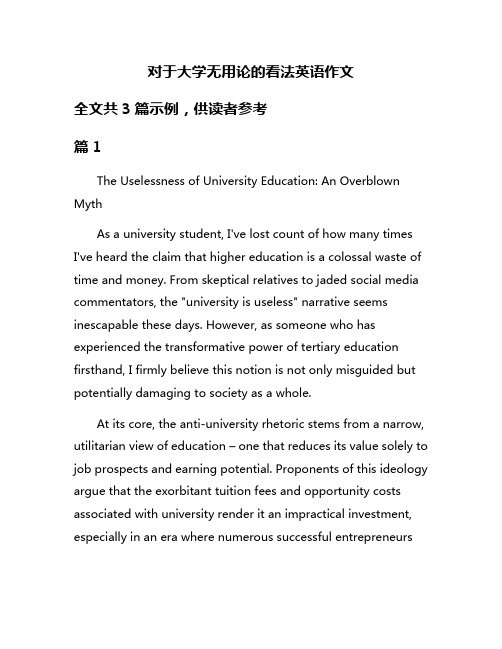
对于大学无用论的看法英语作文全文共3篇示例,供读者参考篇1The Uselessness of University Education: An Overblown MythAs a university student, I've lost count of how many times I've heard the claim that higher education is a colossal waste of time and money. From skeptical relatives to jaded social media commentators, the "university is useless" narrative seems inescapable these days. However, as someone who has experienced the transformative power of tertiary education firsthand, I firmly believe this notion is not only misguided but potentially damaging to society as a whole.At its core, the anti-university rhetoric stems from a narrow, utilitarian view of education – one that reduces its value solely to job prospects and earning potential. Proponents of this ideology argue that the exorbitant tuition fees and opportunity costs associated with university render it an impractical investment, especially in an era where numerous successful entrepreneursand industry leaders have achieved remarkable success without formal degrees.While anecdotal examples of dropout billionaires certainly exist, they represent the exception rather than the rule. The reality is that a university education remains a potent catalyst for social mobility and a reliable predictor of higher lifetime earnings. According to a recent study by the U.S. Federal Reserve, the average bachelor's degree holder earns approximately 1 million more over their lifetime compared to those with only a high school diploma.More importantly, however, the benefits of higher education extend far beyond mere economic gains. A university education equips students with invaluable critical thinking,problem-solving, and communication skills that are universally applicable across a wide range of professions and life situations. In an increasingly complex and rapidly evolving world, the ability to analyze information from multiple perspectives, synthesize disparate ideas, and articulate cogent arguments is more crucial than ever before.Furthermore, the university experience fosters personal growth, independence, and cultural awareness in ways that are difficult to replicate elsewhere. By immersing themselves in adiverse intellectual community, students are exposed to a rich tapestry of ideas, beliefs, and perspectives that challenge their preconceived notions and broaden their worldviews. This process of intellectual and personal exploration is essential for cultivating empathy, open-mindedness, and a deeper appreciation for the complexities of the human experience.Critics of university education often cite the proliferation of online learning platforms and self-paced educational resources as viable alternatives to traditional brick-and-mortar institutions. While these technological advancements have undoubtedly democratized access to knowledge and provided valuable supplementary learning opportunities, they cannot replicate the immersive, multifaceted nature of the university experience.A university education is not merely a transactional exchange of information but a holistic journey of intellectual, personal, and professional development. The serendipitous encounters, collaborative projects, and organic discourse that occur within the confines of a physical campus are integral components of the learning process. Online platforms, while certainly useful, lack the spontaneity and human connections that are so integral to the university experience.Moreover, the value of a university degree extends beyond the classroom. The prestige and reputation associated with renowned institutions carry significant weight in the professional world, opening doors to competitive internships, networking opportunities, and coveted career paths. While meritocracy should be the ultimate arbiter of success, the harsh reality is that pedigree still plays a substantial role in many industries and sectors.Of course, like any human endeavor, the university system is not without its flaws and shortcomings. The skyrocketing costs of tuition, the bureaucratic bloat that plagues many institutions, and the occasional disconnect between academic curricula and real-world applications are valid concerns that warrant thoughtful reform and innovation. However, these issues do not negate the fundamental value and importance of university education; rather, they highlight the need for continuous improvement and adaptation to ensure that universities remain relevant and accessible to all.In conclusion, the notion that university education is useless is a gross oversimplification that fails to capture the multifaceted benefits and lasting impacts of tertiary education. While the pursuit of knowledge should be a lifelong endeavor that extendsbeyond the confines of any single institution, the university experience remains a pivotal catalyst for personal growth, intellectual enrichment, and professional advancement. By fostering critical thinking, cultural awareness, and a deep appreciation for the complexities of the human experience, universities play an indispensable role in shaping well-rounded, globally conscious citizens who are equipped to navigate and contribute to an increasingly interconnected world.篇2My Views on the Uselessness of University EducationAs a student nearing the end of my university career, I can't help but feel a sense of disillusionment and skepticism towards the value and usefulness of a university education. Throughout my years on campus, I've witnessed firsthand the flaws, shortcomings, and questionable practices that cast doubt on the true purpose and benefits of obtaining a degree.From the outset, the cost of attending university is a glaring issue that cannot be ignored. The exorbitant tuition fees, coupled with the ever-increasing cost of living, have placed an enormous financial burden on countless students and their families. It's a burden that, for many, will continue to weighheavily on their shoulders for years, if not decades, after graduation. One can't help but question whether the investment is truly worth the potential returns, especially in an increasingly competitive job market.Beyond the financial aspect, the quality and relevance of the education itself have been subject to much scrutiny. Too often, the curriculum feels outdated, failing to keep pace with the rapidly evolving demands of the modern workforce. The emphasis on theoretical knowledge, while valuable in its own right, often falls short in equipping students with the practical skills and real-world experiences that are highly sought after by employers.Furthermore, the traditional lecture-based teaching methods, which have remained largely unchanged for generations, seem ill-suited to effectively engage and prepare students for the dynamic and ever-changing professional landscape that awaits them. The passive absorption of information, followed by regurgitation during exams, does little to foster critical thinking, problem-solving abilities, or the adaptability that is so vital in today's fast-paced world.Another concerning aspect of university education is the increasing commodification and corporatization of higherlearning institutions. The pursuit of knowledge and intellectual growth, which should be the core mission of any academic institution, has taken a backseat to the relentless pursuit of profit and prestige. Universities have become more akin to businesses, focused on maximizing enrollment, cutting costs, and generating revenue through various means, such as exorbitant fees for services and amenities.This profit-driven mentality has led to a concerning trend of prioritizing quantity over quality, with larger class sizes, fewer resources, and less individualized attention for students. It has also fueled the proliferation of degree programs that cater more to market demands than to fostering a well-rounded, intellectually curious, and critically thinking student body.Moreover, the emphasis on rankings, prestige, and reputational factors has created an environment where universities are more concerned with maintaining their public image and attracting top students and faculty than truly investing in the educational experience and personal growth of their current students. This obsession with metrics and statistics has led to a culture of grade inflation, diluted academic standards, and a tendency to prioritize research and publications over effective teaching and student support.It's worth noting that these criticisms are not universal, and there are certainly exceptions – institutions and programs that genuinely strive to provide a transformative and enriching educational experience. However, for a significant portion of university students, the reality falls far short of the idealized vision of higher education as a catalyst for personal growth, intellectual curiosity, and societal advancement.Despite these concerns, I recognize that a university education still holds value and can provide opportunities that might otherwise be inaccessible. The exposure to diverse perspectives, the opportunity to engage in research and scholarly pursuits, and the networking and collaboration possibilities are all potential benefits that cannot be easily replicated elsewhere.However, it is crucial that we approach this issue with a critical eye and an open mind. We must be willing to challenge the status quo and question the assumptions and practices that have become deeply entrenched within the higher education system. We must be willing to explore alternative models, embrace innovation, and prioritize the needs and aspirations of students over the financial and reputational interests of institutions.Perhaps it's time to rethink the traditional four-year,on-campus model and explore more flexible, personalized, and industry-integrated approaches. Online and hybrid learning platforms, combined with experiential learning opportunities and hands-on internships, could potentially provide a more effective and cost-efficient path to acquiring the skills and knowledge needed for success in the modern workforce.Additionally, we should encourage and incentivize universities to prioritize teaching excellence, implement more interactive and collaborative learning methods, and foster an environment that nurtures critical thinking, creativity, and adaptability. The role of professors should evolve from mere lecturers to facilitators and mentors, guiding students on a journey of intellectual discovery and personal growth.Ultimately, the true value of a university education lies not in the degree itself, but in the knowledge, skills, and experiences acquired along the way. It is a journey of self-discovery, intellectual exploration, and personal growth that should inspire and empower students to become lifelong learners, critical thinkers, and agents of positive change in society.While the current state of higher education is far from perfect, and the criticisms raised are valid and deserving ofserious consideration, we must not lose sight of the profound potential that a well-designed and student-centered university experience can offer. By embracing change, fostering innovation, and prioritizing the needs of students over institutional interests, we can work towards creating a system that truly fulfills the promise of higher education – one that unlocks the full potential of each individual and equips them with the tools to navigate the complexities of the modern world with confidence, creativity, and a thirst for lifelong learning.篇3Is College Really Useless? A Student's PerspectiveThere's been a lot of debate lately about whether going to college is actually worth it or not. With the ever-rising cost of tuition and millennials struggling with student loan debt, some have begun questioning the value of a university education. A number of voices have emerged arguing that college is useless - that it's an overpriced scam that saddles you with debt while failing to adequately prepare you for the workforce. As a current university student, I've thought a lot about this viewpoint, and I have to say that while I understand the concerns, I ultimately disagree with the notion that college is useless. Here's my perspective:The main argument from those who say college is useless seems to be that you don't really need a degree to be successful these days. They point to entrepreneurs and tech moguls like Bill Gates and Mark Zuckerberg who dropped out of college but went on to build billion-dollar companies. If you're talented and motivated enough, the thinking goes, you can make it big without wasting time and money on a university education.It's true that there are extremely successful individuals who never completed college. But let's be honest - those kinds of stories are the exception, not the rule. For every Bill Gates, there are millions of college dropouts struggling to get by. Study after study has shown that on average, those with a bachelor's degree earn substantially more over their lifetime than those with just a high school diploma. Simply put, having a college education opens up far more career opportunities and drastically increases your earning potential.But beyond just the financial benefits, I'd argue that the value of college goes far deeper than just securing a well-paying job. It's an experience that shapes you as a person - it forces you to think critically, communicate effectively, and become more independent and self-reliant. The classes I've taken have introduced me to a world of ideas I never knew existed. Myhistory courses gave me a richer understanding of how we've arrived at the present. My political science classes taught me how to analyze complex issues from multiple perspectives. And wrestling with difficult philosophical concepts fundamentally changed how I view reality.In college, you're constantly being challenged to question your assumptions, back up your arguments, and see things through a new lens. It's an environment designed to transform you from a passive recipient of information into an active,life-long learner. Those kinds of critical thinking skills are invaluable in our modern world, where the job landscape is constantly shifting and the ability to adapt is paramount.What's more, being on a college campus surrounds you with incredible diversity. I've befriended people from all walks of life - different races, religions, socioeconomic backgrounds, you name it. Each new person I've met has expanded my perspective in some way. Learning to work alongside individuals with contrasting viewpoints and finding common ground is amazing preparation for any professional setting. You simply can't get that kind of experience sitting at home taking online classes.Of course, college also comes with plenty of shortcomings that fuel the "useless" argument. Lectures can be dry anddisconnected from the real world. Too many students simply regurgitate information to get good grades rather than actually learning. There's a lack of career guidance and practical job training. Administrators seem more focused on branding and skyrocketing tuition costs rather than providing a quality education. Valid criticisms, all of them.But in my opinion, the flaws with the university system don't negate the value of the experience itself. Getting a college degree is far from a golden ticket to success, but it provides tools and advantages that make achieving your goals more attainable. Maybe some people are self-motivated enough to bypass college and start businesses or land dream jobs. More power to them. For the rest of us, however, college serves an important function.Does the higher education system need reforming? Absolutely. Costs need to come down, curriculums need to adapt, and universities need to start viewing students as more than just cash cows. But the solution isn't to abandon college as useless. It's to fight to make the college experience more valuable. When taken seriously and approached with the right mindset, a university education is anything but useless. It's a vital stepping stone that allows you to discover your passions, expand yourworldview, and gain the skills needed to thrive in our complex, ever-changing world.。
认为大学教育无用的原因英语作文
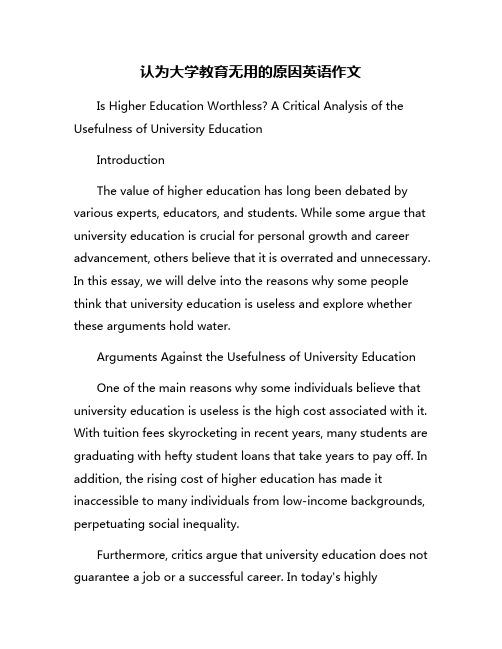
认为大学教育无用的原因英语作文Is Higher Education Worthless? A Critical Analysis of the Usefulness of University EducationIntroductionThe value of higher education has long been debated by various experts, educators, and students. While some argue that university education is crucial for personal growth and career advancement, others believe that it is overrated and unnecessary. In this essay, we will delve into the reasons why some people think that university education is useless and explore whether these arguments hold water.Arguments Against the Usefulness of University EducationOne of the main reasons why some individuals believe that university education is useless is the high cost associated with it. With tuition fees skyrocketing in recent years, many students are graduating with hefty student loans that take years to pay off. In addition, the rising cost of higher education has made it inaccessible to many individuals from low-income backgrounds, perpetuating social inequality.Furthermore, critics argue that university education does not guarantee a job or a successful career. In today's highlycompetitive job market, having a degree is no longer a guarantee of employment. Many graduates find themselves struggling to secure a job in their field of study or end up in low-paying jobs that do not require a degree. This has led to a growing skepticism about the value of a university education.Another reason why some people believe that university education is useless is the disconnect between academic knowledge and real-world skills. Critics argue that many university programs focus too much on theoretical knowledge and fail to provide students with the practical skills needed in the workforce. This has led to a mismatch between the skills that employers are looking for and the skills that graduates possess, further fueling the belief that university education is irrelevant.Moreover, the rapid pace of technological advancement has rendered some university degrees obsolete. As industries evolve and new technologies emerge, the skills and knowledge acquired through a university education may become outdated. This has led to a growing realization that lifelong learning and continuous skill development are more valuable than a traditional university education.Counterarguments in Defense of University EducationDespite the criticisms leveled against university education, many experts argue that it is still a valuable investment in one's future. Firstly, a university education provides individuals with critical thinking, problem-solving, and analytical skills that are essential for success in the modern world. These skills are transferable across various industries and can help individuals adapt to a rapidly changing work environment.Secondly, university education offers individuals the opportunity to explore their interests, expand their horizons, and develop a deep understanding of the world around them. By studying a diverse range of subjects, students can broaden their perspectives, enhance their creativity, and become well-rounded individuals.Furthermore, a university degree is still highly valued by employers and can open doors to a wide range of career opportunities. While it is true that a degree does not guarantee a job, statistics show that graduates earn higher salaries and have lower unemployment rates compared to non-graduates. This demonstrates the economic benefits of a university education in the long run.ConclusionIn conclusion, the debate over the usefulness of university education is far from settled. While there are valid criticisms of the current higher education system, it is important to recognize the benefits that a university education can provide. By equipping individuals with critical thinking skills, expanding their knowledge base, and opening up new opportunities, university education remains a valuable investment in one's future. Ultimately, the value of higher education lies not only in obtaining a degree but in the personal and professional growth that it facilitates.。
论大学学历英语作文
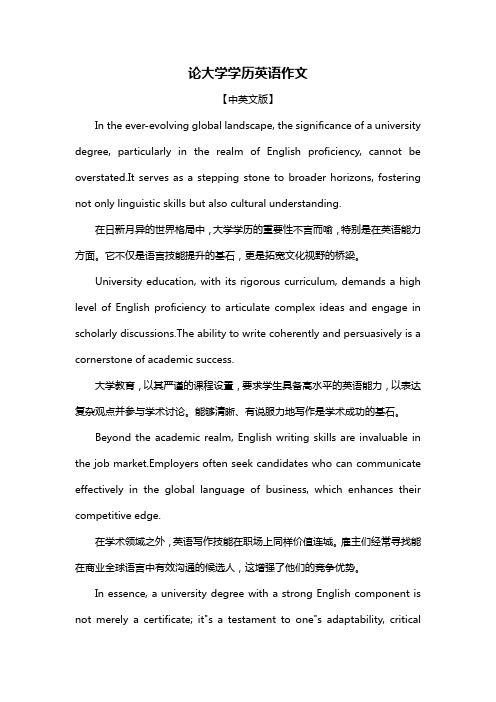
论大学学历英语作文【中英文版】In the ever-evolving global landscape, the significance of a university degree, particularly in the realm of English proficiency, cannot be overstated.It serves as a stepping stone to broader horizons, fostering not only linguistic skills but also cultural understanding.在日新月异的世界格局中,大学学历的重要性不言而喻,特别是在英语能力方面。
它不仅是语言技能提升的基石,更是拓宽文化视野的桥梁。
University education, with its rigorous curriculum, demands a high level of English proficiency to articulate complex ideas and engage in scholarly discussions.The ability to write coherently and persuasively is a cornerstone of academic success.大学教育,以其严谨的课程设置,要求学生具备高水平的英语能力,以表达复杂观点并参与学术讨论。
能够清晰、有说服力地写作是学术成功的基石。
Beyond the academic realm, English writing skills are invaluable in the job market.Employers often seek candidates who can communicate effectively in the global language of business, which enhances their competitive edge.在学术领域之外,英语写作技能在职场上同样价值连城。
因为翻译
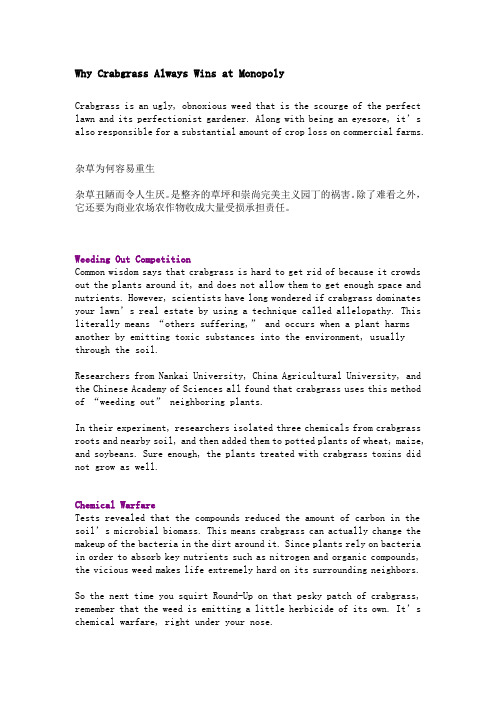
Why Crabgrass Always Wins at MonopolyCrabgrass is an ugly, obnoxious weed that is the scourge of the perfect lawn and its perfectionist gardener. Along with being an eyesore, it’s also responsible for a substantial amount of crop loss on commercial farms.杂草为何容易重生杂草丑陋而令人生厌。
是整齐的草坪和崇尚完美主义园丁的祸害。
除了难看之外,它还要为商业农场农作物收成大量受损承担责任。
Weeding Out CompetitionCommon wisdom says that crabgrass is hard to get rid of because it crowds out the plants around it, and does not allow them to get enough space and nutrients. However, scientists have long wondered if crabgrass dominates your lawn’s real estate by using a technique called allelopathy. This literally means “others suffering,” and occurs when a plant harms another by emitting toxic substances into the environment, usually through the soil.Researchers from Nankai University, China Agricultural University, and the Chinese Academy of Sciences all found that crabgrass uses this method of “weeding out” neighboring plants.In their experiment, researchers isolated three chemicals from crabgrass roots and nearby soil, and then added them to potted plants of wheat, maize, and soybeans. Sure enough, the plants treated with crabgrass toxins did not grow as well.Chemical WarfareTests revealed that the compounds reduced the amount of carbon in the soil’s microbial biomass. This means crabgrass can actually change the makeup of the bacteria in the dirt around it. Since plants rely on bacteria in order to absorb key nutrients such as nitrogen and organic compounds, the vicious weed makes life extremely hard on its surrounding neighbors.So the next time you squirt Round-Up on that pesky patch of crabgrass, remember that the weed is emitting a little herbic ide of its own. It’s chemical warfare, right under your nose.淘汰竞争按照常理,这种杂草很难根除是因为它排挤周围的植物使得它们没有充足的生长空间和养料。
讨论大学教育有没有用的英语作文
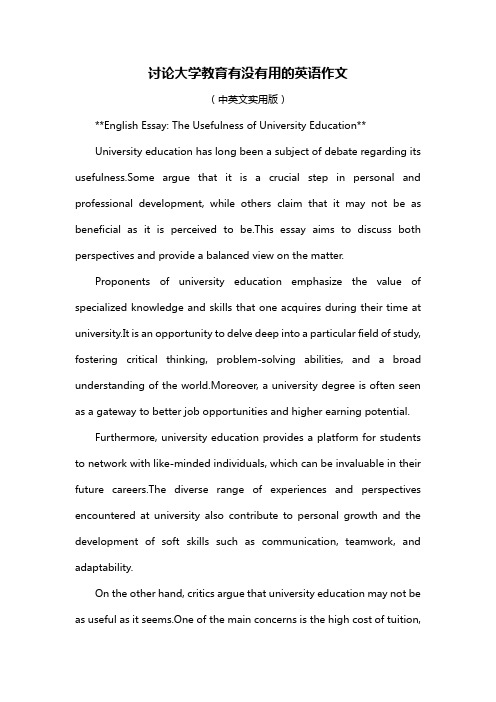
讨论大学教育有没有用的英语作文(中英文实用版)**English Essay: The Usefulness of University Education**University education has long been a subject of debate regarding its usefulness.Some argue that it is a crucial step in personal and professional development, while others claim that it may not be as beneficial as it is perceived to be.This essay aims to discuss both perspectives and provide a balanced view on the matter.Proponents of university education emphasize the value of specialized knowledge and skills that one acquires during their time at university.It is an opportunity to delve deep into a particular field of study, fostering critical thinking, problem-solving abilities, and a broad understanding of the world.Moreover, a university degree is often seen as a gateway to better job opportunities and higher earning potential.Furthermore, university education provides a platform for students to network with like-minded individuals, which can be invaluable in their future careers.The diverse range of experiences and perspectives encountered at university also contribute to personal growth and the development of soft skills such as communication, teamwork, and adaptability.On the other hand, critics argue that university education may not be as useful as it seems.One of the main concerns is the high cost of tuition,which often leads to significant debt for students.This financial burden can take years to repay, raising questions about the return on investment of a university education.Additionally, the rapidly changing job market means that some degrees may not provide the necessary skills for the workforce, leading to underemployment or unemployment among graduates.Moreover, there is a growing recognition that not all learning takes place within the confines of a university.Practical experience, online courses, and alternative forms of education can also equip individuals with valuable skills and knowledge.This has led some to question the traditional four-year degree pathway and whether it is the most effective way to learn and prepare for the future.In conclusion, the usefulness of university education depends on various factors.While it undoubtedly provides valuable knowledge, skills, and opportunities, it is not the only path to success.Prospective students should carefully consider their goals, interests, and financial situation before deciding whether university education is the right choice for them.Ultimately, the key is to seek continuous learning and personal growth, regardless of the educational pathway chosen.**中文作文:大学教育的实用性**大学教育的实用性一直以来都是人们热议的话题。
关于大学学位优势的英语作文

The Prevailing Advantages of UniversityDegreesIn today's rapidly evolving and globally interconnected world, the significance of university degrees has become increasingly prominent. These academic credentials not only serve as a testament to one's educational achievements but also act as a stepping stone towards professional success and personal growth. The following essay delves into the numerous advantages that a university degree confers upon individuals.Firstly, university degrees provide a comprehensive and rigorous educational foundation. During their tenure at a university, students are exposed to a diverse range of courses and subjects, allowing them to develop a broad understanding of various fields. This multi-disciplinary approach fosters critical thinking and analytical skills, which are invaluable in today's knowledge-based economy.Secondly, university degrees enhance employment opportunities. Graduates are often preferred by employers as they possess the necessary skills, knowledge, and expertise to perform complex tasks efficiently. Thereputation and accreditation of the university also play a significant role in increasing the marketability of its graduates.Moreover, university degrees provide access to a network of professional contacts and mentors. Universities are hotbeds of intellectual activity and attractindividuals from diverse backgrounds. This diverse student body becomes a valuable resource for graduates as they enter the professional world, providing them with a support system and potential collaborators.Additionally, university degrees foster personal growth and development. The rigors of academic life, coupled with the challenges of living independently, help students develop resilience, adaptability, and self-confidence. These qualities are crucial for success in both academic and professional environments.Finally, university degrees promote lifelong learning. The skills and knowledge acquired during university studies serve as a foundation for further professional development and personal growth. Graduates are encouraged to pursue further education and professional qualifications, enablingthem to adapt to changing technological and societal landscapes.In conclusion, university degrees offer a range of advantages that span across various aspects of life. They provide a solid educational foundation, enhance employment opportunities, foster professional networks, promote personal growth, and encourage lifelong learning. These prevailing advantages make university degrees an invaluable asset in today's competitive world.**大学学位的普遍优势**在当今迅速发展和全球互联的世界中,大学学位的重要性日益凸显。
有关大学学位优势的英语作文
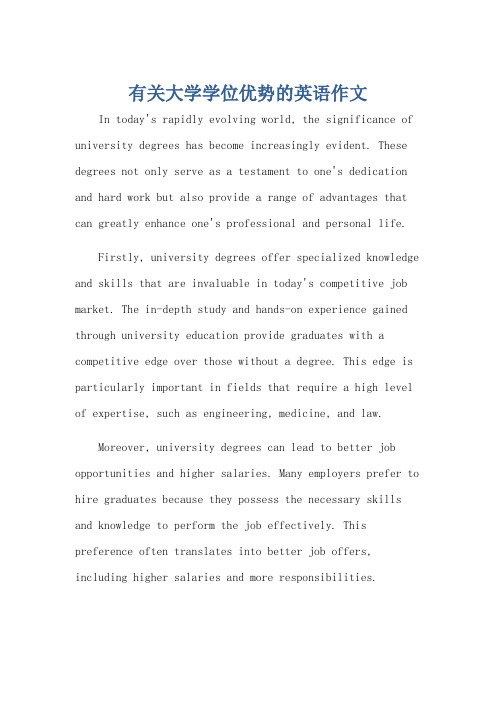
有关大学学位优势的英语作文In today's rapidly evolving world, the significance of university degrees has become increasingly evident. These degrees not only serve as a testament to one's dedication and hard work but also provide a range of advantages that can greatly enhance one's professional and personal life. Firstly, university degrees offer specialized knowledge and skills that are invaluable in today's competitive job market. The in-depth study and hands-on experience gained through university education provide graduates with a competitive edge over those without a degree. This edge is particularly important in fields that require a high level of expertise, such as engineering, medicine, and law.Moreover, university degrees can lead to better job opportunities and higher salaries. Many employers prefer to hire graduates because they possess the necessary skills and knowledge to perform the job effectively. This preference often translates into better job offers, including higher salaries and more responsibilities.Beyond the realm of employment, university degrees also promote personal growth and development. The critical thinking, problem-solving, and communication skills honed through university education are invaluable in all aspectsof life. These skills help graduates navigate through complex situations, make informed decisions, andeffectively communicate their ideas and perspectives.Additionally, university education exposes students toa diverse range of people and ideas. This exposure broadens their horizons, increases their cultural awareness, and prepares them to function effectively in a globalized world. The ability to understand and appreciate different cultures and perspectives is crucial in today's interconnected world. Finally, university degrees provide a sense of achievement and fulfillment. Completing a university degree is a significant milestone that requires dedication, hard work, and perseverance. The sense of accomplishment andpride that graduates feel upon earning their degree is immeasurable and can serve as a powerful motivator in their future endeavors.In conclusion, university degrees offer a myriad of advantages that span across professional and personal aspects of life. They provide specialized knowledge and skills, lead to better job opportunities and higher salaries, promote personal growth and development, broaden one's horizons, and instill a sense of achievement and fulfillment. In today's rapidly changing world, investing in a university degree is an investment in one's future success and happiness.**大学学位的普遍优势**在当今快速发展的世界中,大学学位的重要性日益凸显。
论大学学位英语作文120字
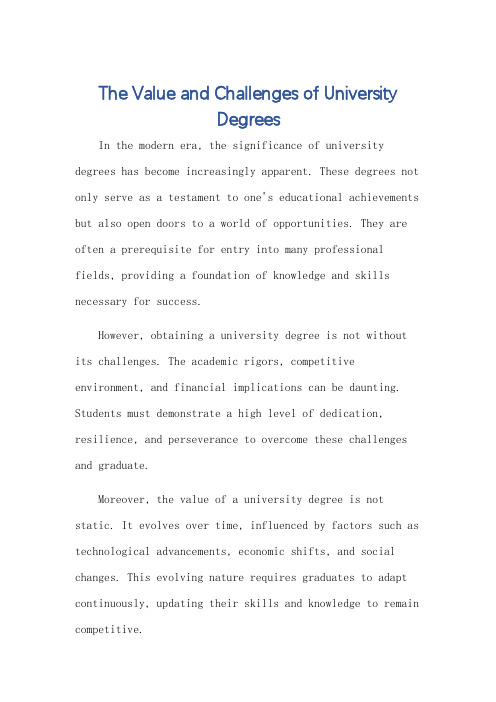
The Value and Challenges of UniversityDegreesIn the modern era, the significance of university degrees has become increasingly apparent. These degrees not only serve as a testament to one's educational achievements but also open doors to a world of opportunities. They are often a prerequisite for entry into many professional fields, providing a foundation of knowledge and skills necessary for success.However, obtaining a university degree is not without its challenges. The academic rigors, competitive environment, and financial implications can be daunting. Students must demonstrate a high level of dedication, resilience, and perseverance to overcome these challenges and graduate.Moreover, the value of a university degree is not static. It evolves over time, influenced by factors such as technological advancements, economic shifts, and social changes. This evolving nature requires graduates to adapt continuously, updating their skills and knowledge to remain competitive.In conclusion, while university degrees offer immense value and opportunities, they also present significant challenges. It is important for students to carefully consider their goals, interests, and abilities before embarking on this journey. By doing so, they can ensure that their degree will serve as a launching pad for a fulfilling and successful career.**大学学位的价值与挑战**在现代社会,大学学位的重要性日益凸显。
有大学文凭的好处英语作文

有大学文凭的好处英语作文In today's rapidly evolving and increasinglycompetitive world, the value of a university degree cannot be overstated. A university education not only enhancesone's knowledge and skills but also opens up a wide rangeof opportunities and benefits that can lead to a more fulfilling and successful life.Firstly, a university degree acts as a strongcredential that attests to an individual's level of education and expertise. It demonstrates to employers that the holder has spent several years studying a specific subject in depth, gaining valuable theoretical knowledgeand practical skills. This credential often acts as a gateway to better job opportunities, as employers often prefer or require candidates with university qualifications. Secondly, a university education fosters critical thinking and problem-solving abilities. University courses often involve in-depth analysis, critical evaluation, andthe development of original ideas. This process helps students to think outside the box, question conventional wisdom, and find innovative solutions to problems. Theseskills are invaluable in the workplace, as they enable employees to identify and address complex issues effectively.Moreover, a university degree provides access to a network of like-minded individuals and professionals. University campuses are hotbeds of intellectual activity and创新, and students have the opportunity to meet and interact with peers from diverse backgrounds and fields of study. These connections can lead to lifelong friendships, collaborations, and professional partnerships that can enhance one's career and personal growth.Additionally, a university degree often leads to higher earning potential. While the cost of a university education can be substantial, the long-term financial benefits often outweigh the initial investment. Graduates with university degrees typically earn higher salaries and have more opportunities for career advancement than those without degrees. This financial security can provide stability and opportunities for personal and professional growth.Furthermore, a university degree can foster personal development and growth. University life involves not onlyacademic learning but also the development of soft skills such as communication, teamwork, leadership, and time management. These skills are crucial for success in both academic and professional environments and can help individuals to achieve their personal and career goals.In conclusion, the benefits of having a university degree are numerous and far-reaching. A university education enhances one's knowledge and skills, opens up better job opportunities, fosters critical thinking and problem-solving abilities, provides access to a network of professionals, leads to higher earning potential, and fosters personal development and growth. While the journey to obtaining a university degree may be challenging, the rewards and opportunities it brings are well worth the effort.**拥有大学文凭的好处**在当今快速发展且竞争日益激烈的世界中,大学文凭的价值不容忽视。
大学学位的优点英语作文
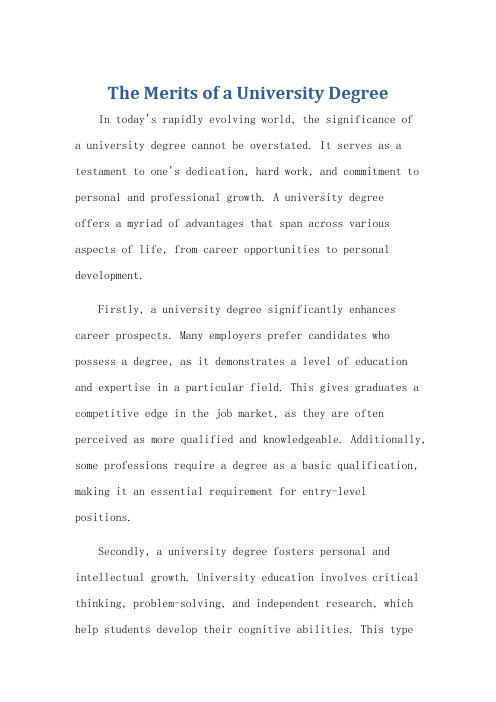
The Merits of a University DegreeIn today's rapidly evolving world, the significance ofa university degree cannot be overstated. It serves as a testament to one's dedication, hard work, and commitment to personal and professional growth. A university degreeoffers a myriad of advantages that span across various aspects of life, from career opportunities to personal development.Firstly, a university degree significantly enhances career prospects. Many employers prefer candidates who possess a degree, as it demonstrates a level of education and expertise in a particular field. This gives graduates a competitive edge in the job market, as they are often perceived as more qualified and knowledgeable. Additionally, some professions require a degree as a basic qualification, making it an essential requirement for entry-level positions.Secondly, a university degree fosters personal and intellectual growth. University education involves critical thinking, problem-solving, and independent research, which help students develop their cognitive abilities. This typeof education encourages students to question, analyze, and evaluate information, fostering a culture of curiosity and inquiry. Furthermore, exposure to diverse perspectives and ideas broadens one's horizons, promoting tolerance and understanding among different groups.Moreover, a university degree provides access to a network of professionals and resources. Universities are hotbeds of innovation and research, attracting individuals from various fields. This diverse community of scholars and experts provides students with opportunities to network, collaborate, and learn from each other. These connections can be invaluable in one's professional life, leading to mentorships, job opportunities, and even collaborations on research projects.Additionally, a university degree often leads to higher earning potential. On average, graduates earn higher salaries than those without a degree. This is because a degree demonstrates a level of education and training that employers value, leading to better job opportunities and higher pay. Furthermore, a degree can open up opportunitiesfor promotions and career advancement, further increasing earning potential.Furthermore, a university degree cultivates life skills such as time management, critical thinking, and problem-solving. These skills are not only beneficial in academic settings but also translate into real-world situations.They help graduates navigate the complexities of life, make informed decisions, and solve problems effectively. These skills are invaluable in any profession and can contributeto personal and professional success.In conclusion, a university degree is an investment in one's future. It offers a range of advantages that span across career, personal, and intellectual growth. By enhancing career prospects, fostering personal development, providing access to resources, increasing earning potential, and cultivating life skills, a university degree paves the way for a more fulfilling and successful life.**大学学位的优点**在当今快速发展的世界中,大学学位的重要性不言而喻。
大学学位的优点英语作文
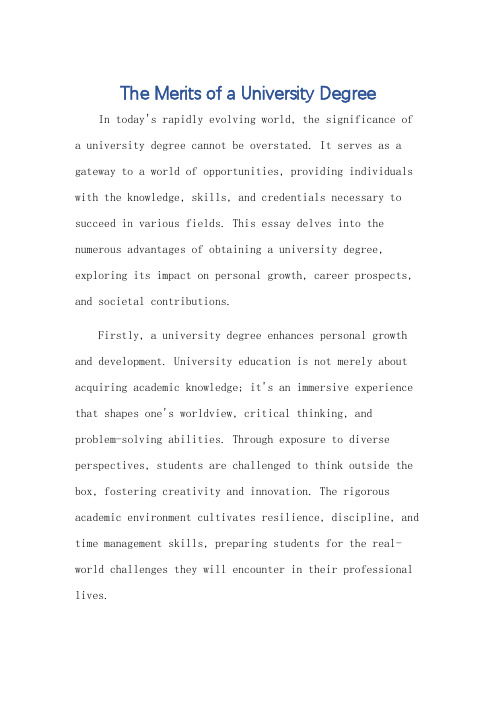
The Merits of a University DegreeIn today's rapidly evolving world, the significance of a university degree cannot be overstated. It serves as a gateway to a world of opportunities, providing individuals with the knowledge, skills, and credentials necessary to succeed in various fields. This essay delves into the numerous advantages of obtaining a university degree, exploring its impact on personal growth, career prospects, and societal contributions.Firstly, a university degree enhances personal growth and development. University education is not merely about acquiring academic knowledge; it's an immersive experience that shapes one's worldview, critical thinking, and problem-solving abilities. Through exposure to diverse perspectives, students are challenged to think outside the box, fostering creativity and innovation. The rigorous academic environment cultivates resilience, discipline, and time management skills, preparing students for the real-world challenges they will encounter in their professional lives.Moreover, a university degree significantly improves career prospects. In today's competitive job market, employers often prefer candidates with a degree as it demonstrates a level of commitment, dedication, and the ability to handle complex tasks. The specialized knowledge gained through university courses equips individuals with the technical skills required in their chosen field, making them more marketable to potential employers. Additionally, university degree holders typically enjoy higher earning potential and greater job security compared to thosewithout a degree.Beyond personal and professional benefits, a university degree also contributes to societal growth and development. Graduates with a broad range of skills and knowledge are essential for driving innovation, research, and technology advancement. They play a pivotal role in addressing complex societal issues such as climate change, poverty alleviation, and public health challenges. Their contributions tovarious fields, whether it be through groundbreaking research, community service, or leadership roles, have a profound impact on society's progress and well-being.In conclusion, a university degree is an invaluable asset that offers numerous advantages on personal, professional, and societal levels. It fosters personal growth and development, enhances career prospects, and contributes to societal growth and development. As we enter an increasingly complex and interconnected world, the need for highly educated and skilled individuals is paramount. Obtaining a university degree is therefore a crucial step towards achieving personal success and making meaningful contributions to society.**大学学位的优点**在当今快速发展的世界中,大学学位的重要性不言而喻。
大学教育有没有用英语作文

大学教育有没有用英语作文University education has long been a topic of debate, with proponents arguing that it provides invaluable knowledge and skills, while critics contend that it is an unnecessary burden. In this essay, we will explore the merits and drawbacks of university education, and attempt to determine whether it is truly useful in today's rapidly changing world.One of the primary arguments in favor of university education is the acquisition of specialized knowledge. By delving deeply into a particular field of study, students are able to develop a comprehensive understanding of complex concepts and theories. This depth of knowledge can be invaluable in a variety of professional settings, allowing individuals to tackle complex problems and contribute to the advancement of their respective industries.Moreover, university education often provides students with the opportunity to develop critical thinking and problem-solving skills. Through rigorous coursework, extensive research, and collaborativeprojects, students learn to analyze information, think creatively, and develop innovative solutions. These skills are highly sought after by employers, as they enable individuals to adapt to the ever-evolving demands of the modern workplace.Another key benefit of university education is the exposure to diverse perspectives and experiences. By interacting with peers from various backgrounds and engaging with a wide range of academic disciplines, students are able to broaden their horizons and challenge their preconceptions. This exposure can foster greater empathy, cultural awareness, and the ability to work effectively in diverse teams, all of which are essential in today's globalized world.Furthermore, university education can serve as a platform for personal growth and self-discovery. The transition from high school to university often presents students with new challenges and opportunities for self-reflection. Through the pursuit of their academic interests, students can uncover their passions, develop their unique talents, and gain a better understanding of their place in the world.However, critics of university education argue that it is an increasingly costly and impractical investment, particularly in light of the ever-changing job market. With the rise of alternative educational pathways, such as online courses and vocational training,some question the value of a traditional four-year degree program. They contend that the significant financial burden of university tuition and the opportunity cost of foregone earnings may outweigh the potential benefits.Additionally, there is a concern that university education does not always align with the specific skills and knowledge required in the workforce. Some argue that the academic curriculum is too theoretical and disconnected from the practical realities of the job market, leaving graduates ill-equipped to navigate the demands of their chosen careers.Moreover, the perceived oversaturation of university graduates in certain fields has led to concerns about the job prospects and earning potential of those with a university degree. In some cases, individuals with advanced degrees may find themselves competing for positions that do not necessarily require the level of education they have attained, leading to a sense of underemployment and disappointment.Despite these criticisms, it is important to recognize that the value of university education extends beyond immediate job prospects and financial returns. The intellectual stimulation, personal growth, and exposure to diverse perspectives that university education provides can have lasting impacts on an individual's life, enabling them tobecome more engaged citizens, critical thinkers, and lifelong learners.Furthermore, the skills and knowledge acquired through university education can be transferable across a wide range of industries and professions, allowing individuals to adapt and thrive in an ever-changing job market. The ability to think critically, communicate effectively, and work collaboratively are valuable assets that can be applied in a variety of professional settings.In conclusion, the debate surrounding the usefulness of university education is a complex one, with valid arguments on both sides. While the financial and practical considerations cannot be ignored, it is important to recognize the broader benefits of a university education, such as the acquisition of specialized knowledge, the development of critical thinking and problem-solving skills, and the exposure to diverse perspectives.Ultimately, the decision to pursue a university education should be a personal one, based on an individual's goals, interests, and the specific demands of their chosen career path. By carefully weighing the pros and cons, and considering the long-term implications, individuals can make an informed decision about the value of university education in their lives.。
大学学历的优势的英语作文
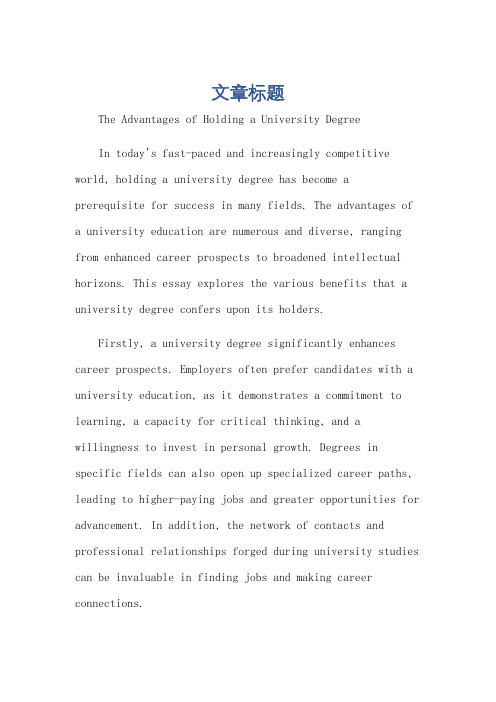
文章标题The Advantages of Holding a University DegreeIn today's fast-paced and increasingly competitive world, holding a university degree has become aprerequisite for success in many fields. The advantages of a university education are numerous and diverse, ranging from enhanced career prospects to broadened intellectual horizons. This essay explores the various benefits that a university degree confers upon its holders.Firstly, a university degree significantly enhances career prospects. Employers often prefer candidates with a university education, as it demonstrates a commitment to learning, a capacity for critical thinking, and a willingness to invest in personal growth. Degrees in specific fields can also open up specialized career paths, leading to higher-paying jobs and greater opportunities for advancement. In addition, the network of contacts and professional relationships forged during university studies can be invaluable in finding jobs and making career connections.Secondly, a university education broadens intellectual horizons. University courses cover a wide range of subjects, allowing students to explore areas of interest beyond their chosen field. This interdisciplinary approach cultivates a more rounded and informed individual, capable of understanding and engaging with diverse ideas and perspectives. The critical thinking skills honed through university studies also equip graduates to analyze complex problems and make informed decisions in their personal and professional lives.Moreover, a university degree fosters personal growth and development. The transition from high school to university marks a significant milestone in an individual's life. It requires a leap of independence, as students must manage their time, finances, and social relationshipswithout the constant supervision of parents or teachers. This process of self-discovery and self-reliance helps individuals to develop a stronger sense of identity and purpose. The challenges and opportunities encounteredduring university studies also contribute to the formationof resilient and adaptable personalities.Furthermore, a university degree can be a source of personal fulfillment. For many people, pursuing higher education is a means of satisfying their intellectual curiosity and fulfilling their personal aspirations. The opportunity to delve deeply into areas of interest, to engage with experts in the field, and to contribute to knowledge and understanding through research or creative work can be deeply rewarding.In conclusion, the advantages of holding a university degree are numerous and diverse. It enhances career prospects, broadens intellectual horizons, fosters personal growth and development, and provides a source of personal fulfillment. While the path to obtaining a degree may be challenging, the benefits it confers are well worth the effort. As we navigate the complexities of the modern world, a university education remains a powerful tool for success and personal fulfillment.**大学学历的优势**在当今快节奏且竞争日益激烈的世界中,拥有大学学历已成为许多领域成功的先决条件。
关于大学文凭的建议英语作文

The Value and Importance of a UniversityDegreeIn today's rapidly evolving and increasingly competitive global landscape, the significance of a university degree cannot be overstated. A university education not only equips individuals with the necessary skills and knowledge to excel in their chosen fields but also acts as a gateway to a world of opportunities and personal growth.Firstly, a university degree serves as a testament to one's dedication, hard work, and commitment. It is a proof of the individual's ability to persevere through rigorous academic training and emerge victorious. This perseverance and resilience are highly valued by employers, as they indicate that the graduate is capable of handling challenging work environments and pressures.Moreover, a university education provides students with a broad range of skills that are invaluable in the workplace. These skills, such as critical thinking, problem-solving, and teamwork, are transferable across various industries and job roles. Employers often prefergraduates who possess these skills as they add value to the organization and contribute towards its overall growth and success.Beyond the workplace, a university degree also opens up a world of personal growth and development. University life exposes students to diverse perspectives, cultures, and ideas, challenging them to think outside the box and broaden their horizons. This exposure not only enhances their understanding of the world but also cultivates a sense of empathy and respect for others, making them more well-rounded and responsible individuals.Additionally, a university degree acts as a passport to further educational and career opportunities. Graduates have the option to pursue advanced degrees, such asmaster's or doctoral programs, which can lead to higher-paying jobs and positions of leadership. They can also engage in research and development, contribute to societal issues, and become agents of change in their respective fields.In conclusion, the value and importance of a university degree are immeasurable. It is not merely a piece of paperbut a symbol of hard work, dedication, and成就. It is a passport to a world of opportunities and a launchpad for personal growth and development. In today's knowledge-based economy, a university degree has become a prerequisite for success, and it is crucial for individuals to invest in their education to secure a bright future.大学文凭的价值与重要性在当今快速演变且竞争日益激烈的全球环境中,大学文凭的重要性不言而喻。
大学的学位英语作文
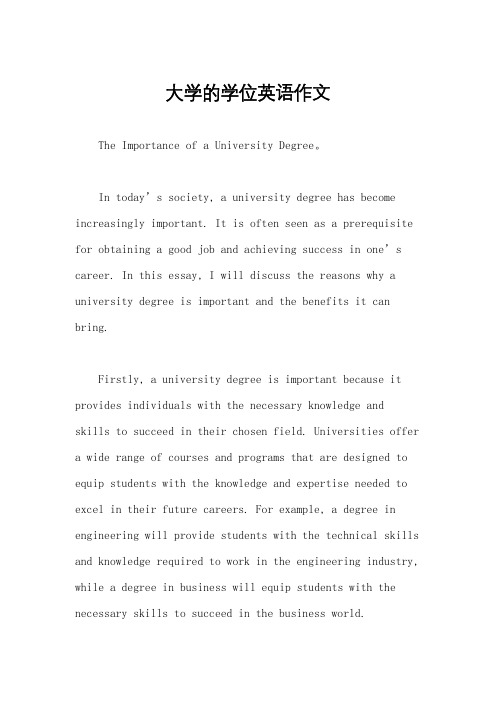
大学的学位英语作文The Importance of a University Degree。
In today’s society, a university degree has become increasingly important. It is often seen as a prerequisite for obtaining a good job and achieving success in one’s career. In this essay, I will discuss the reasons why a university degree is important and the benefits it can bring.Firstly, a university degree is important because it provides individuals with the necessary knowledge andskills to succeed in their chosen field. Universities offer a wide range of courses and programs that are designed to equip students with the knowledge and expertise needed to excel in their future careers. For example, a degree in engineering will provide students with the technical skills and knowledge required to work in the engineering industry, while a degree in business will equip students with the necessary skills to succeed in the business world.Furthermore, a university degree is important becauseit can significantly increase an individual’s earning potential. Studies have shown that individuals with a university degree tend to earn higher salaries than those without a degree. This is because a degree is often seen as a sign of competence and expertise, and employers are willing to pay a premium for individuals who possess these qualities. In addition, a university degree can also open up opportunities for career advancement and promotion, further increasing an individual’s earning potential.In addition to the financial benefits, a university degree can also provide individuals with a sense of personal fulfillment and achievement. Graduating from university is a significant milestone in one’s life, andit can bring a great sense of pride and accomplishment. Furthermore, the knowledge and skills acquired during a university education can also contribute to personal growth and development, helping individuals to become more well-rounded and knowledgeable individuals.Finally, a university degree is important because itcan provide individuals with a competitive advantage in the job market. In tod ay’s competitive job market, employers are often inundated with applications from qualified candidates. A university degree can help individuals to stand out from the crowd and demonstrate their commitmentto their chosen field. Furthermore, many employers view a degree as a sign of dedication and perseverance, and are more likely to consider candidates with a degree for employment opportunities.In conclusion, a university degree is important for a variety of reasons. It provides individuals with the knowledge and skills needed to succeed in their chosen field, can significantly increase earning potential, andcan provide a sense of personal fulfillment and achievement. Furthermore, a university degree can also provideindividuals with a competitive advantage in the job market. As such, obtaining a university degree is an important step towards achieving success in one’s career.。
讨论大学教育有没有用的英语作文
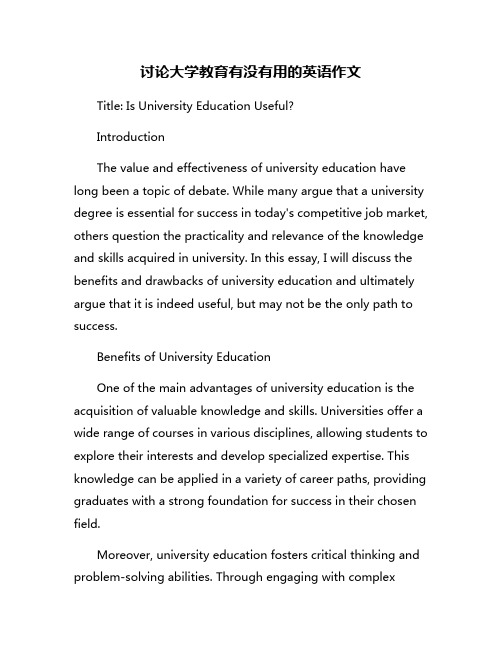
讨论大学教育有没有用的英语作文Title: Is University Education Useful?IntroductionThe value and effectiveness of university education have long been a topic of debate. While many argue that a university degree is essential for success in today's competitive job market, others question the practicality and relevance of the knowledge and skills acquired in university. In this essay, I will discuss the benefits and drawbacks of university education and ultimately argue that it is indeed useful, but may not be the only path to success.Benefits of University EducationOne of the main advantages of university education is the acquisition of valuable knowledge and skills. Universities offer a wide range of courses in various disciplines, allowing students to explore their interests and develop specialized expertise. This knowledge can be applied in a variety of career paths, providing graduates with a strong foundation for success in their chosen field.Moreover, university education fosters critical thinking and problem-solving abilities. Through engaging with complexconcepts and challenging assignments, students learn to analyze information, evaluate arguments, and develop logical reasoning skills. These transferable skills are highly sought after by employers and can enhance graduates' employability and career prospects.Furthermore, university education provides a valuable networking opportunity. Students have the chance to connect with peers, professors, and professionals in their field, building relationships that can lead to job opportunities, mentorship, and collaboration. Networking is essential in today's competitive job market, and university education offers a valuable platform for students to expand their professional network.Drawbacks of University EducationDespite its benefits, university education also has its drawbacks. One of the main criticisms of university education is its high cost. Tuition fees, textbooks, accommodation, and other expenses can put a significant financial burden on students and their families. This can deter individuals from pursuing higher education or leave them with hefty student loan debts upon graduation.Another drawback of university education is the increasing emphasis on theoretical knowledge over practical skills. Manyargue that traditional university courses focus too much on academic theory and not enough on real-world applications. This can leave graduates ill-prepared for the demands of the workforce, where practical skills and hands-on experience are often more valuable than theoretical knowledge.Furthermore, the traditional education system may not cater to the diverse learning styles and career goals of all students. Some individuals may thrive in a structured academic environment, while others may prefer hands-on, experiential learning. University education may not be the best fit for everyone, and alternative education pathways, such as vocational training or online courses, may better suit certain individuals' needs and aspirations.ConclusionIn conclusion, university education is undeniably useful in providing valuable knowledge, skills, and networking opportunities for students. However, it is not the only path to success, and its high cost, focus on theoretical knowledge, and lack of flexibility may limit its effectiveness for some individuals. As society evolves and the job market becomes increasingly competitive and diverse, it is important to acknowledge the limitations of traditional university education and explorealternative education pathways that better meet the needs and goals of all learners. Ultimately, the value of university education lies in its ability to empower individuals with the knowledge, skills, and connections needed to succeed in their chosen field and make a positive impact on the world.。
有关大学学位优势的英语作文

The Advantages of a University DegreeIn today's competitive world, obtaining a university degree has become increasingly crucial for personal and professional growth. The advantages of holding a university degree are numerous and diverse, ranging from enhanced employment opportunities to broadened intellectual horizons.Firstly, a university degree significantly improves one's employment prospects. Many employers prefer candidates who possess a degree, as it demonstrates a commitment to learning and a certain level of expertise in a particular field. Degrees often lead to higher-paying jobs and more opportunities for advancement within an organization. Additionally, some professions require a degree as a prerequisite for entry, making it a necessary step for those pursuing specific careers.Moreover, a university education fosters intellectual growth and development. Through rigorous courses and independent research, students gain a deeper understanding of their chosen field and develop critical thinking skills. They learn to analyze complex issues,evaluate information, and formulate arguments, skills that are invaluable in both academic and professional settings. Furthermore, a university degree provides access to a rich network of resources and people. Universities are hubs of intellectual activity, attracting scholars, researchers, and industry leaders from around the world. Students have the opportunity to engage with these individuals, learn from their experiences, and establish valuable connections that may lead to future opportunities.Lastly, a university degree contributes to personal growth and self-development. The journey of obtaining a degree is often filled with challenges and setbacks, but these experiences help individuals develop resilience, perseverance, and a sense of purpose. They learn to navigate uncertainty, manage stress, and set goals for themselves, skills that are essential for success in life.In conclusion, the advantages of a university degree are numerous and far-reaching. It improves employment prospects, fosters intellectual growth, provides access to resources and people, and contributes to personal growth and self-development. Therefore, investing in a universityeducation is a worthwhile decision that can pay dividends throughout one's life.。
大学学位好处的英语作文
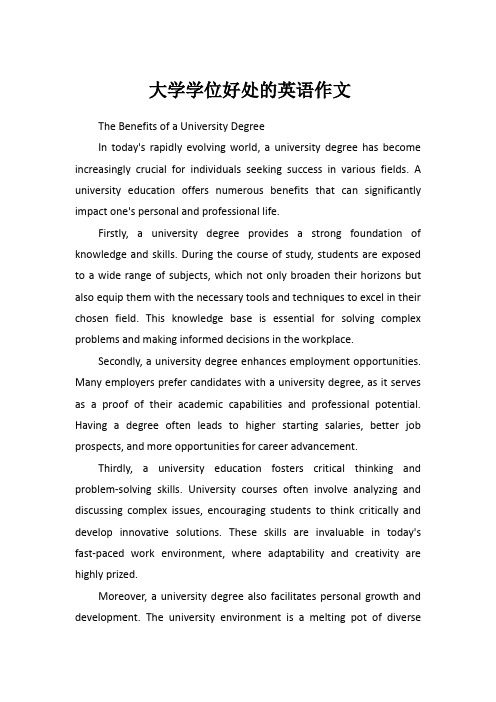
大学学位好处的英语作文The Benefits of a University DegreeIn today's rapidly evolving world, a university degree has become increasingly crucial for individuals seeking success in various fields. A university education offers numerous benefits that can significantly impact one's personal and professional life.Firstly, a university degree provides a strong foundation of knowledge and skills. During the course of study, students are exposed to a wide range of subjects, which not only broaden their horizons but also equip them with the necessary tools and techniques to excel in their chosen field. This knowledge base is essential for solving complex problems and making informed decisions in the workplace.Secondly, a university degree enhances employment opportunities. Many employers prefer candidates with a university degree, as it serves as a proof of their academic capabilities and professional potential. Having a degree often leads to higher starting salaries, better job prospects, and more opportunities for career advancement.Thirdly, a university education fosters critical thinking and problem-solving skills. University courses often involve analyzing and discussing complex issues, encouraging students to think critically and develop innovative solutions. These skills are invaluable in today's fast-paced work environment, where adaptability and creativity are highly prized.Moreover, a university degree also facilitates personal growth and development. The university environment is a melting pot of diversecultures, ideas, and experiences. It offers students the opportunity to meet people from different backgrounds, making them more understanding, tolerant, and open-minded. Additionally, university life involves making decisions, managing time, and handling pressure, which helps students develop self-confidence, resilience, and leadership qualities.In conclusion, a university degree is a valuable asset that provides numerous benefits for personal and professional growth. It equips individuals with the necessary knowledge, skills, and experiences to excel in their chosen field and contribute to society. Therefore, investing in a university education is a wise decision that can significantly impact one's future.。
关于大学学位优势的英语作文
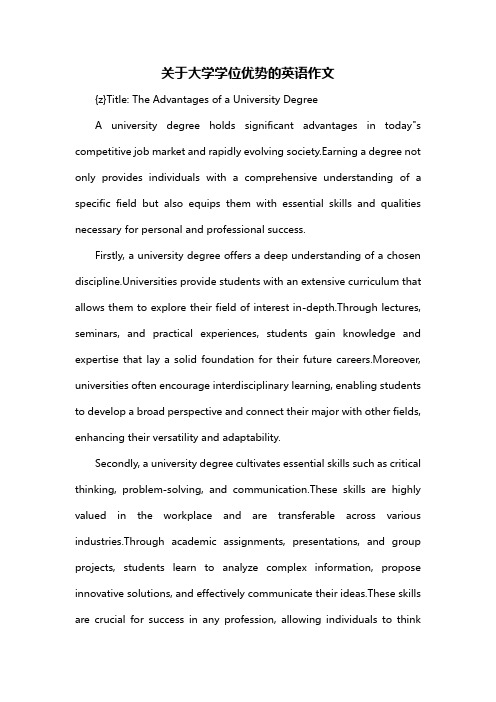
关于大学学位优势的英语作文{z}Title: The Advantages of a University DegreeA university degree holds significant advantages in today"s competitive job market and rapidly evolving society.Earning a degree not only provides individuals with a comprehensive understanding of a specific field but also equips them with essential skills and qualities necessary for personal and professional success.Firstly, a university degree offers a deep understanding of a chosen discipline.Universities provide students with an extensive curriculum that allows them to explore their field of interest in-depth.Through lectures, seminars, and practical experiences, students gain knowledge and expertise that lay a solid foundation for their future careers.Moreover, universities often encourage interdisciplinary learning, enabling students to develop a broad perspective and connect their major with other fields, enhancing their versatility and adaptability.Secondly, a university degree cultivates essential skills such as critical thinking, problem-solving, and communication.These skills are highly valued in the workplace and are transferable across various industries.Through academic assignments, presentations, and group projects, students learn to analyze complex information, propose innovative solutions, and effectively communicate their ideas.These skills are crucial for success in any profession, allowing individuals to thinkindependently, collaborate effectively, and articulate their thoughts coherently.Additionally, a university degree helps individuals develop strong time management and organizational skills.The demands of university life, including managing multiple courses, assignments, and extracurricular activities, require students to prioritize their tasks and meet deadlines effectively.This discipline and efficiency in managing responsibilities prepare students for the fast-paced work environment, where effective time management is essential for productivity and success.Furthermore, a university degree provides individuals with networking opportunities.Universities offer a diverse community of students, faculty, and professionals from various backgrounds and industries.Through participation in clubs, organizations, and internships, students can build valuable connections, expand their professional network, and gain insights into potential career paths.These connections can be beneficial for future job opportunities, mentorship, and career development.Lastly, a university degree often opens doors to higher-paying jobs and career advancement prospects.Employers increasingly value higher education qualifications, as they demonstrate a individual"s commitment to learning, discipline, and dedication.A university degree can provide acompetitive edge in the job market, as it showcases a individual"s ability to handle complex tasks, adapt to new challenges, and contribute to the growth of an organization.In conclusion, a university degree offers numerous advantages, including comprehensive knowledge in a chosen field, essential skills development, enhanced employability, and networking opportunities.Investing in a university education is a valuable step towards personal and professional growth, preparing individuals for success in an ever-changing and demanding world.。
英语作文万能模板学位证
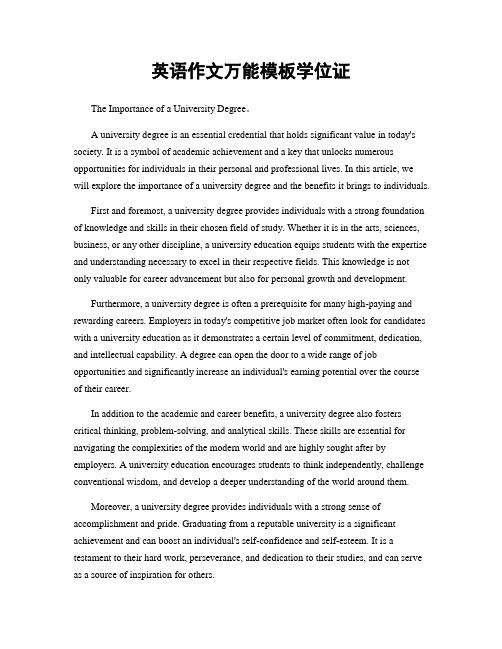
英语作文万能模板学位证The Importance of a University Degree。
A university degree is an essential credential that holds significant value in today's society. It is a symbol of academic achievement and a key that unlocks numerous opportunities for individuals in their personal and professional lives. In this article, we will explore the importance of a university degree and the benefits it brings to individuals.First and foremost, a university degree provides individuals with a strong foundation of knowledge and skills in their chosen field of study. Whether it is in the arts, sciences, business, or any other discipline, a university education equips students with the expertise and understanding necessary to excel in their respective fields. This knowledge is not only valuable for career advancement but also for personal growth and development.Furthermore, a university degree is often a prerequisite for many high-paying and rewarding careers. Employers in today's competitive job market often look for candidates with a university education as it demonstrates a certain level of commitment, dedication, and intellectual capability. A degree can open the door to a wide range of job opportunities and significantly increase an individual's earning potential over the course of their career.In addition to the academic and career benefits, a university degree also fosters critical thinking, problem-solving, and analytical skills. These skills are essential for navigating the complexities of the modern world and are highly sought after by employers. A university education encourages students to think independently, challenge conventional wisdom, and develop a deeper understanding of the world around them.Moreover, a university degree provides individuals with a strong sense of accomplishment and pride. Graduating from a reputable university is a significant achievement and can boost an individual's self-confidence and self-esteem. It is a testament to their hard work, perseverance, and dedication to their studies, and can serve as a source of inspiration for others.Furthermore, a university degree opens the door to a vast network of alumni, professors, and industry professionals. This network can provide valuable connections, mentorship, and opportunities for career advancement. Many universities also offer career services, job fairs, and networking events to help students and graduates connect with potential employers and build their professional network.In conclusion, a university degree is an invaluable asset that provides individuals with a wealth of knowledge, skills, and opportunities. It is a symbol of academic achievement and a gateway to a successful and fulfilling career. Whether it is in the form of a bachelor's, master's, or doctoral degree, the benefits of a university education are undeniable. As such, pursuing a university degree is a worthwhile investment in one's future and can lead to a lifetime of personal and professional fulfillment.。
- 1、下载文档前请自行甄别文档内容的完整性,平台不提供额外的编辑、内容补充、找答案等附加服务。
- 2、"仅部分预览"的文档,不可在线预览部分如存在完整性等问题,可反馈申请退款(可完整预览的文档不适用该条件!)。
- 3、如文档侵犯您的权益,请联系客服反馈,我们会尽快为您处理(人工客服工作时间:9:00-18:30)。
The Usefulness of University Degrees
Regarding to the question whether getting university degrees is important for success in life,some people say “yes” due to the phenomenon in modern society that most successful celebrities,such as actors,sportsmen,scientists,politicians even many farmers,have received university education and got university degrees.However,others assert that there is no necessary relationship between university degrees and a wonderful life.Maybe both of them are right in a way but in our group’s opinion,a university degree is essential in our further life.
The people who deny the importance of university degrees hold the opinion that most university degrees are theoretical and do not prepare students for the real world.They think that society is the best teacher and educates them the most.They take Laoganma--Tao Huabi,the CEO of the most famous chili patse company Laoganma ,who even didn’t finish her primary school for example.Also,Bill Gates,as they said,didn’t obtain his university degree before he successfully built his corporation--The Microsoft. Therefore they think that university degrees are of little value.
However, we do not agree with them. As Einstein once said, “Education is what remains after one has f orgotten everything he learned in school”,university education benefits us through our life.Not only do university degrees earn us a living,but they also enhance the quality of our lives.Furthermore ,we choose to accept university education just because of our own intentions , quite different from school which we have to go to . It is the university education that brings us various benefits.However,
not all of us gain the opportunities of attending university just because of grade ,financial and other problems.
Obviously,many of us deem that the university degree is useful and necessary.In general, there are several reasons for this optimism.
A university degree is beneficial to enhance your salary .Sometimes a university degree means maturity,bounce and drive.Job hunter, who graduates with a university degree, are offered more opportunities for better positions and higher salary. In addition, a university degree has longer impact on one’s career life because such a degree shows the graduate’s knowledge in a specified field and ability to work independently.
University degrees make you more advantages in the careers fair competition.Having a university degree in hand,you will be more confident to face the employers especially when others don’t have.Most importantly,it’s your better degree that provides you with broader range of jobs.When the work is hard, employers tends to choose the one who has a university degree because a university degree indicates higher skills and quality needed.
University de grees are especially needed in many professional fields.”Many professional positions--especially those entail specialized certification or licensing--require a better university degree”,such as medical,machinery,law,finance.As for me,my major is machinery so I have to master plenty of complex professional skills needed for the machine designing major.Therefore,it's hardly possible for a man to design a machine without a
machinery degree.
As a word,the university degree will benefits us a lot .If we have a university degree,we will have more opportunities to find a better job and have a more comfortable life than those who don't have .Although it is reported that there will be more jobs held by people without university degrees between 2004 and 2014 by Bureau of labor statistics (BLS),those who have a university degree will earn much higher wages on average.
Sources:
/lounge/importance-of-university-11548.html
/wiki/Bill_Gates
Bill Gates From Wikipedia, the free encyclopedia
/news/article-2494751/University-wasted-pupils-Child ren-work-useless-degree-says-Harrow-headteacher.html
University is wasted on some pupils: 'Children should go to work rather than get useless a degree' says former Harrow headteacher
By CHRIS PLEASANCE。
